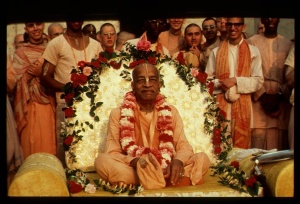SB 6.13.17

A.C. Bhaktivedanta Swami Prabhupada
TEXT 17
tato gato brahma-giropahūta
ṛtambhara-dhyāna-nivāritāghaḥ
pāpas tu digdevatayā hataujās
taṁ nābhyabhūd avitaṁ viṣṇu-patnyā
SYNONYMS
tataḥ—thereafter; gataḥ—gone; brahma—of the brāhmaṇas; girā—by the words; upahūtaḥ—being invited; ṛtambhara—on the Supreme Lord, who maintains truth; dhyāna—by meditation; nivārita—impeded; aghaḥ—whose sin; pāpaḥ—the sinful activity; tu—then; dik-devatayā—by the demigod Rudra; hata-ojāḥ—with all prowess diminished; tam—him (Indra); na abhyabhūt—could not overcome; avitam—being protected; viṣṇu-patnyā—by Lord Viṣṇu's wife, the goddess of fortune.
TRANSLATION
Indra's sins were diminished by the influence of Rudra, the demigod of all directions. Because Indra was protected by the goddess of fortune, Lord Viṣṇu's wife, who resides in the lotus clusters of Mānasa-sarovara Lake, Indra's sins could not affect him. Indra was ultimately relieved of all the reactions of his sinful deeds by strictly worshiping Lord Viṣṇu. Then he was called back to the heavenly planets by the brāhmaṇas and reinstated in his position.